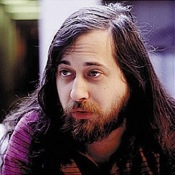
Richard Stallman
.:GNU
What is the GNU project?
GNU (pronounced as two syllables with a hard g, "ga new") is a recursive acronym standing for "GNU's not Unix".
The first goal of the project, initiated for the Free Software Foundation by Richard Stallman, was to produce a fully functional Unix-compatible operating system completely free of copyrighted code.
Although GNU was proposed in the mid-eighties, it was not until the early nineties that it became a reality.
Before that time, many GNU utilities (such as gcc, bash, and Emacs) were developed, but GNU itself was not complete. Originally, the GNU Hurd, a highly modular kernel based on Mach, was central to the operating system.
However, Hurd was unstable and Mach itself was dependent on proprietary code. Fortunately, GNU found a replacement in Linux, a Unix-like kernel written from scratch by Linus Torvalds.
Because many are superior to their proprietary counterparts, GNU tools have spread to other (frequently non-free) operating systems, including most Unix-based systems.
Popular packages include a C/C++ compiler (gcc/g++), a debugger (gdb), an assembler (gas), an editor (Emacs), a shell (bash), a PostScript-like file system (GhostScript), a compressor (GNU Zip), an environment for the X Window System (GNOME), most Unix file utilities, and much more.
GNU programs are free in the sense that there are no copyrights, but programs are protected by the GPL (GNU General Public License).
Programs are typically available via FTP or by paying a nominal fee to the GNU project to cover duplication and postage costs.
For more information on the current status of the GNU project, visit the GNU web page at:
http://www.gnu.org/
A system is termed UNIX only if it complies fully with (and is certified by) the Single Unix Specification (SUS) standards. Similar systems that do not comply fully or are not certified are termed Unix-like operating systems. Examples of popular Unix-like systems include Linux and Xenix.